This article is adapted from AQ’s special report on closing the gender gap | Leer en español | Click here to see the rest of our Top 5
In 2018, Costa Rica’s Epsy Campbell Barr became the first Black woman in Latin America to be elected vice president — despite the fact that Afro-descendant women comprise up to 17% of the region’s population.
Her historic election alongside President Carlos Alvarado followed three unsuccessful presidential bids, one right after Costa Rica’s first female president, Laura Chinchilla, left office with an approval rating under 20%. When asked if she, as a woman, was judged for Chinchilla’s performance, Campbell said, “That’s how gender discrimination works.”
“When a woman makes a mistake, it’s every woman’s mistake. It doesn’t work that way with men.”
Campbell, 57, began her career as a human rights and environmental activist and an economist researching women’s inclusion. As vice president, she has led a working group to try to close the gender pay gap, and also launched a program offering credit to rural women working in conservation. The granddaughter of Jamaican immigrants to Costa Rica, Campbell has also led several organizations, including the Network of Afro-Caribbean and Afro-Latin American Women, which she co-founded in 1992 to highlight the unique struggles of Black women.
“We‘ve come a long way,” Campbell told AQ. “Many feminist women have learned that one can’t talk about sexism without talking about racism.”
Campbell entered politics in 2002, and after nearly two decades and two congressional terms, she still faces the difficult standards women in politics are held to.
“Everything down to what we wear is a topic of debate.”
Campbell said she’s committed to connecting the struggles for racial justice and gender equality, pointing to what she sees as a “deep transformation” emerging globally in the wake of the murder of George Floyd in the United States.
“In the same way that it’s not just Afro-descendants demanding racial justice,” said Campbell, “we need more men committed to the fight for women, understanding that a new social pact includes them too.”







